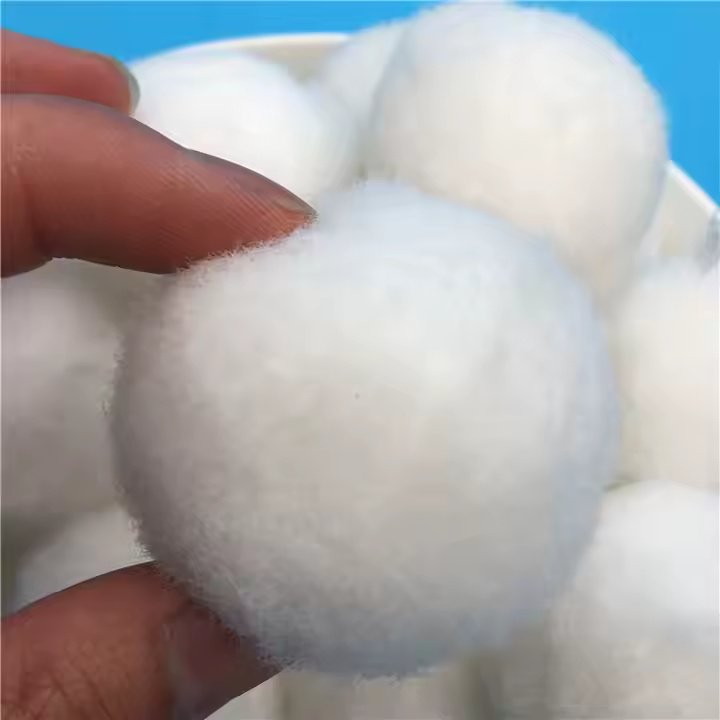Pool filter balls are an essential component of maintaining the cleanliness and clarity of your swimming pool. They provide superior filtration compared to traditional sand filters, offering better performance in removing debris, dirt, and contaminants. However, like any pool equipment, they can become damaged over time, especially when exposed to harsh chemicals. Understanding how to protect your filter balls and repair any damage they might incur is vital for ensuring their longevity and effectiveness.

Common Causes of Chemical Damage to Pool Filter Balls
The first step in overcoming chemical damage is understanding its causes. Chemicals play a significant role in pool maintenance, but they can also damage your filter balls over time. Some of the most common culprits of chemical damage include:
1. High Chlorine Levels:
While chlorine is essential for sanitizing pool water, excess chlorine can degrade the material of the filter balls. Over time, prolonged exposure to high chlorine levels weakens the structure, reducing its filtration efficiency.
2. Acidic or Alkaline Balances:
Pool water that is too acidic or too alkaline can also damage pool filter balls. The material is sensitive to shifts in pH levels, which can lead to premature wear and tear, making the balls less effective at filtering.
3. Stabilizers and Algaecides:
Chemicals used to stabilize chlorine or prevent algae growth, such as cyanuric acid, can also harm the filter balls if used in excess or improperly balanced.
How to Overcome Chemical Damage
Now that we know what causes chemical damage to pool filter balls, let’s discuss strategies for preventing and overcoming these issues. With the right care and maintenance, you can significantly extend the life of your filter balls and protect your investment.
1. Regularly Monitor Chemical Levels
One of the most effective ways to prevent chemical damage is by maintaining balanced pool chemistry. Regularly test your pool’s water to ensure that the chlorine, pH, and alkalinity levels are within the recommended ranges. Ideally, the pH should be between 7.2 and 7.6, and chlorine levels should be kept between 1.0 to 3.0 ppm. By keeping the chemical levels in check, you can minimize the risk of chemical damage to your pool filter balls.
2. Use the Best Filter Balls
When it comes to choosing pool filter balls, quality matters. Investing in best filter balls can help reduce the risk of chemical degradation. High-quality filter balls are made from durable materials that are resistant to harsh chemicals, ensuring they perform longer and more effectively. Look for filter balls that are specifically designed to handle high chlorine concentrations, have high dirt-trapping capacities, and are designed for long-term use.
3. Clean and Rinse Regularly
Another important step is regularly cleaning and rinsing your pool filter balls. After heavy use, filter balls can accumulate dirt, oils, and chemical residues. Washing them with a mild detergent or using a specialized filter ball cleaner will help remove the buildup and restore their filtering power. It’s essential to rinse thoroughly to ensure no chemical residue remains, which could lead to damage over time.
4. Replace Filter Balls When Needed
Even with proper maintenance, pool filter balls will eventually wear out. Over time, chemical exposure and regular use will take their toll. When you notice that your filter balls are no longer providing optimal filtration or have become brittle, it may be time for a replacement. Purchasing high-quality filter balls from a reputable pool filter balls factory can ensure that you’re getting a product that meets your pool’s specific needs.
5. Limit the Use of Harsh Chemicals
To further protect your pool filter balls, limit the use of harsh chemicals like strong algaecides or high-chlorine shock treatments. When using chemicals, always follow the manufacturer’s instructions and use them sparingly. This will reduce the risk of overexposing your filter balls to potentially damaging substances.
6. Consider Using a Pool Cover
Using a pool cover can also help reduce chemical exposure by preventing debris from entering the pool and minimizing the need for excessive chemical treatments. This protective layer can help maintain better water quality, reducing the load on your filter balls and extending their lifespan.
When to Replace Pool Filter Balls
Even with the best care and maintenance, pool filter balls will eventually need to be replaced. If your filter balls show signs of heavy chemical degradation such as brittleness, discoloration, or decreased filtration performance, it’s time to replace them. Be sure to source your new filter balls from a trusted pool filter balls factory to ensure you’re getting a reliable and long-lasting product.
Conclusion
Chemical damage to pool filter balls is a common issue, but with proper care and maintenance, you can mitigate the risks and extend the life of your filter balls. Regularly monitoring chemical levels, using the best filter balls, cleaning and rinsing them often, and replacing them when necessary will help maintain optimal pool filtration. By investing in high-quality products and being mindful of chemical usage, you can enjoy a cleaner and healthier swimming pool without worrying about frequent damage to your filter system. So, keep your pool chemistry balanced, and your pool filter balls will serve you well for many seasons to come!
